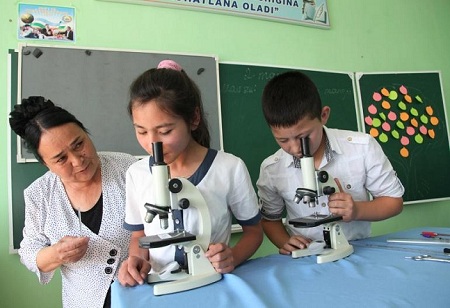-
The steady growth of a country's economic and social well-being, as well as the successful application of scientific and technological achievements, are directly dependent on quality education and scientific advancement. Higher education is often regarded as the most important component in driving economic innovation and ensuring a country's global competitiveness. Internationalization, globalization, and integration processes are major elements influencing the development of modern higher education. Higher education is reaching an increasing number of people in underdeveloped countries. The number of students has expanded 15 times in recent years, and more than half a billion young people are now enrolled in higher education institutions. At the moment, large-scale reforms being implemented in Uzbekistan in every sphere and industry aim to stabilize the country's economy, enhance social life, and boost its worldwide reputation. The designation of 2023 as "the year of attention to people and quality education" by Uzbekistan's president opens up a new channel for increasing the worth and interests of people in our country, as well as their spiritual-ethical, political-legal, and contemporary thinking. Reforms in people training procedures in the realm of education in particular, in the higher education system, have accelerated. Opportunities for the construction of educational campuses based on higher education institutions and the gradual transition to the "University 3.0" system have been provided. Cooperation with international higher education and research organizations, realization of basic projects, personnel exchange, and specialized training on the basis of Double Diploma granting programs have all begun. Higher education coverage expanded from 9% to 38%, while the number of higher education institutions increased about 2.5 times.
A variety of efforts have been taken out at the Namangan Institute of Engineering and Technology (NIET) towards the internationalisation of higher education and academic mobility. The institution collaborates with more than ten nations. The institution is currently implementing seven international funding projects. Within the context of reciprocal international cooperation and memorandums of understanding between institutions, 25 students who earned their bachelor's degree at NEIT were admitted to study for their master's certificate at foreign universities in the 2022-23 academic year. They include two students from each of Spain, Germany, and South Korea, as well as 13 from Russian universities. Each university has one student from Latvia, Japan, the Netherlands, France, Singapore, and the United States of America. In addition, 16 scientific researchers from the institute are currently studying at the PhD level in Turkey (6 doctoral students), China (3), South Korea (2), Russia (3), and Spain (2). Today, five foreign professors from the US, Malaysia, and Zambia, and 5 foreign students from Russia, Kyrgyzstan, Tajikistan, and Zambia are studying at the institute. Partner universities in exchange programs include countries like France, Malaysia, Russia, Poland, China, Spain, India, Kazakhstan, Turkey, and Belarus. NIET also collaborates with different levels of grant projects financed by embassies which attract hard and soft components to the institute, and educational and cultural scholarship programmes.
These include a 20-seat Indian classroom supported by the Indian Embassy, a phonetics language laboratory room for ITEC program participants, and a US Embassy-funded American Corner Library. Texas University, Oklahoma State University, Virginia Tech University, Louisville University, and Murray State University are all partners with NIET. As a result, four American teachers are employed at the institute under specific contracts. Two qualified American professors have been invited to the institute as part of the "Modernisation of the Engineering Field at NIET" project, which is being organized within the framework of the memorandum of understanding between Oklahoma University and NEIT and is being guided by the international Fulbright English Teaching Assistant (ETA) program. They are working at the institution under a long-term collaboration arrangement. The long-term project "Development of Scientific Research and International Cooperation" between the University of Tennessee-Knoxville (Knoxville, Tennessee) and NIET is being implemented within the scope of the UniCEN program. The institution was awarded three-year funding through the European Union's Erasmus project, which sends academics from the institute to the EU on a yearly basis to engage in short-term training courses. In five areas, 2+2 collaborative educational programs are now being developed with the Saratov State Technical University of Russia and the Belarus National Technical University of Belarus. It is worth noting that the implementation of internationalisation and mobility programs in NIET is increasingly bearing results. For the past two years, our institute has participated in worldwide ratings.
In the academic year of 2023, 264 students are to be involved in the educational process in Turkey, Russia, Malaysia, Hungary, Kazakhstan, Tajikistan, Kyrgyzstan, and 93 foreign professors and teachers in the online and traditional format. This year, the team of the institute aims to establish joint master's programs between NIET in cooperation with higher education institutions in South Korea, Hungary, Turkiye, Russia, Malaysia, and Kazakhstan, strengthen close cooperation in international Erasmus projects, do start-ups in practical and fundamental projects, and create planned knowledge transfer centers, meetings and visits at various levels to strengthen the mobility programs of students and professors. The concept of sustainable development of international cooperation put forward by Uzbekistan President Sh.M. Mirziyoyev significantly enriches the activities of higher educational institutions, expands the scope of interests, creates personnel training and international cooperation projects between universities, and defines new tasks for the future.
🍪 Do you like Cookies?
We use cookies to ensure you get the best experience on our website. Read more...

